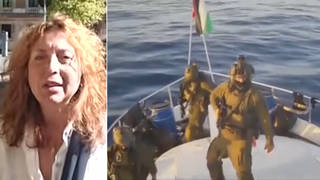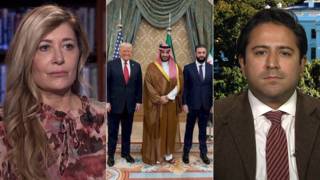
We speak to the author of a new Human Rights Watch report that details how border guards in Saudi Arabia have killed hundreds of Ethiopian migrants and asylum seekers — many of whom are fleeing human rights abuses in Ethiopia’s Tigray region — trying to cross the Yemen-Saudi border since March 2022. The report documents Saudi border guards shooting women and children, firing explosive weapons at migrants and “executing” people at close range. Ethiopia’s Foreign Ministry announced Tuesday that it will conduct a joint investigation with the Saudi government, but Saudi Arabia has previously denied similar allegations. “I don’t have any faith that they would conduct an independent investigation on these mass killings,” says Nadia Hardman, a researcher at Human Rights Watch and the author of the report, titled “'They Fired on Us Like Rain.'”
Transcript
AMY GOODMAN: The Ethiopian government says it plans to investigate a report that border guards in Saudi Arabia have killed hundreds of Ethiopian migrants and asylum seekers who have tried to cross the Yemen-Saudi border since March 2022. In a statement Tuesday, Ethiopia’s Foreign Ministry called the deaths a, quote, “alleged mass execution” and said it will conduct the probe, quote, “in tandem with the Saudi authorities.”
This comes after Human Rights Watch published a damning new report that documents the killings and calls for them to cease immediately. The report cites firsthand accounts from 42 people, over a hundred verified videos and photos, and an analysis of satellite imagery. This is an excerpt of a video accompanying the report. A warning: It contains graphic descriptions and images.
ACTOR’S VOICE: Even when I remember, I cry. I saw a guy calling for help. He lost both his legs. He was screaming and saying, “Are you leaving me here? Please don’t leave me.” We couldn’t help him, because we were running for our lives.
NADIA HARDMAN: Ethiopian migrants and asylum seekers have been tortured, injured or killed by Saudi Arabian border guards at the Yemen-Saudi border. At least hundreds have been killed trying to make this crossing between March 2022 and June 2023.
ACTOR’S VOICE: When Saudi border guards see a group, they fire continuously. When they kill everyone, they go down to collect all those who didn’t die. This is what happened to me. I survived, and they came to meet me and showed me the dead. Then they took us to a detention center and beat us all there.
NADIA HARDMAN: Human Rights Watch’s extensive investigation includes firsthand accounts from 42 people and the verification and geolocation of over a hundred videos and photos, and the analysis of hundreds of square kilometers of satellite imagery.
We found evidence that Saudi border guards have used explosive weapons and shot people at close range, in what appears to be a policy targeting migrants and asylum seekers, including women and children, at the border. Human Rights Watch believes this may amount to crimes against humanity.
Saudi Arabia’s border forces should stop intentionally using lethal force to kill Ethiopian migrants and asylum seekers with explosive weapons.
AMY GOODMAN: That’s part of a video accompanying the new Human Rights Watch report titled “'They Fired on Us Like Rain.'” In a minute, we’ll speak with the report’s author. First, this is a man in Ethiopia named Mustafa Sofian Mohammed, who lost his leg after being shot at while attempting to cross into Saudi Arabia.
MUSTAFA SOFIAN MOHAMMED: [translated] Two years ago, I went to Saudi via Djibouti, thinking I would find a job to change my family and my life. I came back to my family empty-handed, with only one leg. …
We were 45 in number, and only three survived. Of that, I am sure. I called them all and managed to speak to three of them. The rest are unreachable. The rest, only God knows what happened to them. …
They were firing nonstop, and I thought the sky was falling on me. … I cannot describe how shocking the sound was. Bullets came from our back and front. … I thought I was dreaming at first. I couldn’t believe my eyes. I looked around and landed my eyes again at it and knew I had no leg anymore. I started praying, lying there.
My fellow Ethiopians planning to go to Saudi, please look at me. There is a rain of bullets waiting for you. Look at me and learn.
AMY GOODMAN: We’re joined right now by the report’s author, Nadia Hardman, a researcher in the Refugee and Migrant Rights Division of Human Rights Watch.
Nadia, welcome to Democracy Now! A devastating report. Talk about how you learned of this, and explain further what has taken place over the last year.
NADIA HARDMAN: Yeah. Thank you so much for having me on the program.
Look, I’ve been documenting this route, the eastern route, that’s not very well known, of predominantly Ethiopian migrants that are leaving from the Horn of Africa through Yemen, facilitated by smuggling and trafficking networks, that are extremely abusive in themselves, to the border with Saudi Arabia, trying to cross and access job opportunities in the country. We know that over 750,000 Ethiopians actually do live and work in Saudi Arabia, so there are job opportunities they’re trying to get to.
In the past, I’d say since 2014, we have documented border killings by Saudi border guards, but these were infrequent and occasional. Generally, that pattern previously was one of mass detentions in horrifying detention centers inside Saudi Arabia, and then deportations back to Ethiopia. What we found in this report — and I’d say, really, it’s an escalation from the last two years — is a complete change in policy, from occasional shootings to widespread and systematic attacks, use of explosive weapons against large groups of unarmed migrants and asylum seekers — many of them are women and kids — or shootings at close range of smaller groups trying to cross into the country.
And, you know, we’ve also supplemented the many testimonies that I collected with a massive digital investigation, where we were able to analyze kilometers of satellite imagery, posts, Saudi border guard posts, all along that route, to show that the Saudis knew or should have known that they were firing on migrants and asylum seekers from Ethiopia. We found burial sites, that have increased over the research period that I conducted. And we’ve also geolocated videos of dead and wounded migrants, that I think you probably saw in the video that was just screened.
JUAN GONZÁLEZ: And, Nadia, I wanted to ask you — Ethiopia is one of the largest countries in Africa in terms of population, second only to Nigeria, about 125 million people. You mentioned 750,000, approximately, Ethiopians are working in Saudi Arabia. What is driving those who are fleeing the country? What are the conditions in Ethiopia that they face?
NADIA HARDMAN: Yeah. I mean, it’s a good question. And honestly, the reasons have remained steady over the years. The conflicts and the locality of those conflicts have changed. We know that the conflict in northern Ethiopia has driven a lot of the Tigrayans that I interviewed, and then extreme poverty. You know, most people who I spoke to who left said that they were desperate to try and access a better life in Saudi Arabia. And they know Ethiopians working there. You know, there is a diaspora inside Saudi Arabia living and working. You know, I don’t know if it’s successfullly, but, generally, they’re making a living.
There is also this criminal network of smugglers and traffickers that do prey on and exploit Ethiopians that potentially don’t know what awaits them. You know, I heard a figure that over 50% didn’t know that there was a conflict inside Yemen. I certainly don’t think they understand, potentially, the brutality they may face. I spoke to women and girls that were sexually assaulted by other migrants and their traffickers during the journey and then had to undergo the killings that they witnessed when they tried to cross the border.
JUAN GONZÁLEZ: And what’s been the response of the Ethiopian and Saudi governments, especially in Saudi Arabia? Has there been, basically, a change of policy from the top in the government in dealing with migrants coming into the country?
NADIA HARDMAN: Look, a lot of the questions I get on this, you know, my responses are generally conjecture, because we haven’t had a direct engagement with the Saudi authorities on this. We did receive a reply from the Houthi forces, who were also implicated in our report, because they facilitate access to the border of smugglers and traffickers, so they’re helping people get there. But from the Saudi authorities, no, we wrote a list of questions, and we put our findings to the authorities well over three weeks ago, with a long list of questions, and we did not receive a reply. Anything that I’ve seen recently, in the last few days since we released the report, has been replies to journalists.
And this new joint investigation that was announced, you know, we’ve not received any statement on that. That’s, again, a general statement that’s been put out. You know, I would definitely cast doubt on the independence of an investigation conducted by Ethiopia and Saudi Arabia. I don’t know of a single credible investigation that the Saudi authorities have conducted on the just massive violations that they have committed against Ethiopian migrants and other migrants, for that matter, inside of the country. And I don’t have any — I don’t have any faith that they would conduct an independent investigation on these mass killings.
I would also point out that the U.N., in the form of its independent rapporteurs, wrote to Saudi Arabia last year, and these letters were made public in October, outlining similar abuses to ours. And Saudi Arabia responded in March of this year, in 2023, and said that they found no evidence of any of the kind of allegations that were listed there. I think we have already shown that Saudi Arabia is unwilling and unable to conduct any kind of meaningful investigation. And we need that for the victims, and especially redress for them.
AMY GOODMAN: Nadia, your report clearly finds systemic attacks and killings of those crossing the border. Can you talk more about Saudi border guards firing explosive weapons at migrants who had just been released from temporary Saudi detention?
NADIA HARDMAN: Yeah. I mean, this was actually the last case that I interviewed. I mean, I generally interviewed a practice of Saudi border guards collecting the survivors. So, people would undergo an explosive weapon attack. You know, people said they were fired at by mortar projectiles, so deeply traumatized, and then they would be — and injured, much of the time — approached by Saudi border guards, who would then temporarily detain them in detention centers, which are also abusive, and they experience ill-treatment and torture inside them, and obviously no medical assistance or care.
But this one case, that is really — it’s the last case I interviewed. It’s this woman, crossed the border, was detained by Saudi border guards, who took her to a detention facility for eight months. She was then released and pushed back towards the Yemeni border. And then her and her group were fired on by an explosive weapon. So she was literally fleeing back into Yemen. And her group sustained this attack, and 20 — she witnessed 20 people killed. She then also sent me a photograph of the wound that she had, a gaping wound on the side of her face that she suffered because of shrapnel, she said, that flew at her face. And I think that’s also shown in our video, I believe.
AMY GOODMAN: And where are the weapons from, Nadia?
NADIA HARDMAN: So, look, one thing, you know, we don’t know is who is manufacturing the weapons and exactly what is being used. Again, we asked Saudi Arabia a list of questions about this. We did find Saudi border guard posts, and we found vehicles where we believe there’s machinery mounted on top of them. You can’t see much from satellite imagery, so we’re going on a lot of witness testimony. But one thing we did do is send the pictures that individuals I interviewed sent me, you know, graphic images and video footage, and we sent that to some external forensic experts, who confirmed that the images are consistent with explosive weapons use and show evidence of fragmentation, shrapnel, burn scars. So, you know, we’re confident that explosive weapons are used. And obviously, the question as to who is making them, where are they from, exactly what is being used, is something that we want to investigate further and ask the Saudis, particularly, to come forward with this.
AMY GOODMAN: And do you know if the mass killing is continuing?
NADIA HARDMAN: Yeah, I continue to receive reports that the killings are ongoing. I’m not investigating right now, because we put out the report, but it’s extremely distressing to know that this is continuing to this day. And that’s our constant and immediate call to Saudi Arabia, to cease killing Ethiopian migrants and asylum seekers at its border, and to implore other governments to put pressure on Saudi Arabia. There’s a menu of recommendations that we have that states could implement to ensure that there is accountability for these horrendous crimes.
AMY GOODMAN: Nadia Hardman, we want to thank you for being with us, author of the new Human Rights Watch report titled “'They Fired on Us Like Rain.'” Nadia is a researcher in the Refugee and Migrant Rights Division of Human Rights Watch. We’ll link to that report at democracynow.org.
Coming up, it’s the 70th anniversary of the CIA-, MI6-backed coup in Iran, 1953. Stay with us.












Media Options